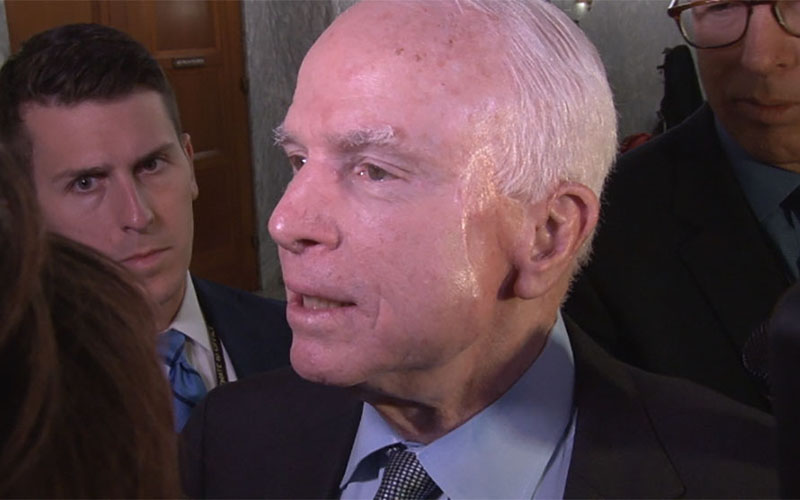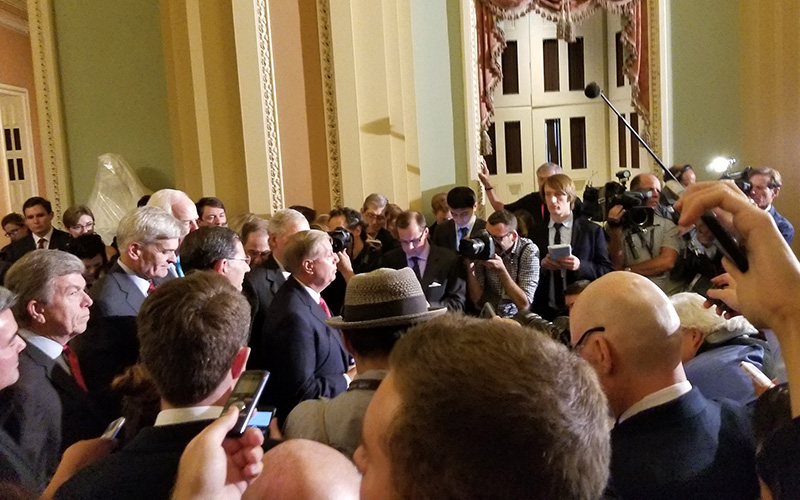WASHINGTON – Senate leaders abandoned their latest effort to repeal and replace the Affordable Care Act, saying Tuesday that they would turn their attention to tax reform after key GOP defections doomed the health care proposal.
The announcement came one day after Sen. Susan Collins of Maine joined fellow Republican Sens. John McCain of Arizona and Rand Paul of Kentucky who said they would vote against the bill. That would have given Democrats one more vote than they needed to kill the so-called Graham-Cassidy bill, the most recent of several failed GOP attempts to overturn Obamacare.
McCain, who said Friday that he could not “in good conscience” support a bill that was being rushed through to beat a Sept. 30 deadline, stood by that decision Tuesday, saying the issue needs to “have hearings, have debate, have amendments” before it’s voted on.
Even as he conceded defeat Tuesday, Sen. Lindsey Graham, R-South Carolina, said “it’s not if, only a matter of when” Congress passes a fix to what Republicans see as a broken health care system.
“The missing ingredient for us as Republicans has been we know what we don’t like,” said Graham, lead sponsor of the bill and a close friend of McCain’s. “Now we have something to talk about that makes sense to 50 Republican senators, a lot of governors and – I hope – the American people.”
That was echoed by Senate Majority Leader Mitch McConnell.
“We haven’t given up on changing the American health care system. We are not going to be able to do that this week, but it still lies ahead of us,” McConnell said. “Where we go from here is tax reform.”
The Graham-Cassidy bill would have dismantled major components of Obamacare, including the mandate for individuals to get health insurance, subsidies to help low-income people pay for their coverage and the expansion of Medicaid, among other changes.
The bill would have reallocated federal Medicaid funding to states as a block grant, which supporters said would give states more control over how health care dollars were spent.
But it came under harsh attack by Democrats, who said it would result in millions losing their health insurance and states losing hundreds of billions in federal funding over the next decade. Projections by private groups suggested that Arizona could lose anywhere from $6.9 billion in federal funds to $19 billion by 2027.
Democratic concerns appeared to be buttressed Monday, when the Congressional Budget Office estimated that millions of Americans would lose insurance under Graham-Cassidy.
Senate Minority Leader Chuck Schumer said the bill was a “disaster,” and said Democrats are willing to work with Republicans on a bipartisan solution to fix the existing health care system.
“We are ready in this moment, now that this bill has been withdrawn, to roll up our sleeves and work in a bipartisan way with our Republican colleagues to stabilize the system and make improvements,” Schumer said. But he warned that if Republicans try to take health care away from people “they will fail once again.”
But Sen. Jeff Flake, R-Arizona, speaking on the floor of the Senate earlier Tuesday, criticized what he called the “outrageous rhetoric” from Democrats on GOP efforts to repeal and replace Obamacare, long a promise of Republican lawmakers.
Flake said the obstructionism comes as 155,000 Arizonans have been priced out of affordable health insurance under the Affordable Care Act.
“We’ve got to fix this,” he said. “People in Arizona are hurting, and let’s stop with the rhetoric that this is somehow a cut and that people are going to be left on the streets … I hope that we can stop the outrageous rhetoric on this and actually fix the problem.”
But Democrats were not the only ones unhappy with Graham-Cassidy. Rep. Andy Biggs, R-Mesa, said earlier Tuesday that the bill did not go far enough to reverse Obamacare.
“I am not enthused by it,” Biggs said of the bill. And that was before the bill failed, when he said Senate leaders were “trying to buy votes” to support it.
“If it were to ever come over to the House … I would reserve the right to read it and then reject it,” Biggs said.
President Donald Trump said he was “disappointed in certain so-called Republicans” who opposed the bill, without naming names. But, like Graham, he said he thinks that, “At some point there will be a repeal and replace, but we’ll see whether or not that point is now or will be shortly thereafter.”
Collins and McCain were among the three GOP votes that doomed the last Senate attempt to replace the Affordable Care Act – with McCain giving a surprising, and dramatic, thumbs down in a late-night Senate vote in July.
McCain believes that something needs to be done, but that the next step is “regular order, just like I’ve been saying. Introduce legislation, have hearings, have debate, have amendments.”

